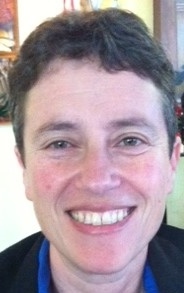Diana Shapiro, MFT - #MFC 41975

Licensed Marriage & Family Therapist
Accepts Alameda County MediCal & HealthPac insurance
Servicios en Español
Text: (510) 338-4932
Email: [email protected]
I first explored my interest in becoming a therapist in 1998 at the Berkeley Free Clinic, where I went through an intensive training in a peer counseling model based on the work of Carl Rogers, one of the most important figures in Humanistic psychology.
Rogers believed that the quality of the relationship between the therapist and client is more important than how much specialized knowledge the therapist has. In his view, a successful therapy relationship is one in which the therapist feels and expresses empathy (understanding, the desire and effort to understand another human being), displays unconditional positive regard (warmth and acceptance), and congruence (honesty, authenticity).
He believed that in the context of such a relationship, people's natural ability to develop and grow towards their potential thrives. Another trademark of Humanistic psychology is the understanding that we can't and shouldn't push others to change. Change happens on its own when the conditions are right. And paradoxically, the first step towards making a change is accepting ourselves just as we are. This was my introduction to therapy and these ideas are still very close to my heart.
After a few years of peer counseling, I decided to get my Masters degree in psychology, and I graduated from CSU, Hayward in 2001 with a M.S. in counseling.
During my internship years, I worked as a therapist in several agencies, including the Pacific Center for Human Growth, Berkeley's G/L/B/T community center, The Center for Adaptive Learning (a program for adults with developmental, neurological disabilities), and Blue Oak Therapy Center (a non-profit Berkeley).
Over the years, I have greatly broadened my understanding of the different schools of therapy while always keeping the values of Humanistic psychology close by. Some of my important influences include Hakomi and Sensorimotor Psychotherapy, holistic models of therapy that makes use of the state of mindfulness to integrate body and mind experiences. In 2004, I completed a 9-month training in Sensorimotor Psychotherapy for the treatment of trauma. I am also trained in EMDR, another effective tool for healing trauma.
I have been an avid student of Buddhism and Buddhist psychology for the past twelve years. Although therapy is a secular endeavor, there are many useful tools and ideas from Buddhist psychology that can be adapted for people of any religious or spiritual orientation.
Now, I have a private practice in Berkeley, CA, and I enjoy my work as a therapist tremendously. I feel very honored to be a part of the process of healing and growth of my therapy clients.
Accepts Alameda County MediCal & HealthPac insurance
Servicios en Español
Text: (510) 338-4932
Email: [email protected]
I first explored my interest in becoming a therapist in 1998 at the Berkeley Free Clinic, where I went through an intensive training in a peer counseling model based on the work of Carl Rogers, one of the most important figures in Humanistic psychology.
Rogers believed that the quality of the relationship between the therapist and client is more important than how much specialized knowledge the therapist has. In his view, a successful therapy relationship is one in which the therapist feels and expresses empathy (understanding, the desire and effort to understand another human being), displays unconditional positive regard (warmth and acceptance), and congruence (honesty, authenticity).
He believed that in the context of such a relationship, people's natural ability to develop and grow towards their potential thrives. Another trademark of Humanistic psychology is the understanding that we can't and shouldn't push others to change. Change happens on its own when the conditions are right. And paradoxically, the first step towards making a change is accepting ourselves just as we are. This was my introduction to therapy and these ideas are still very close to my heart.
After a few years of peer counseling, I decided to get my Masters degree in psychology, and I graduated from CSU, Hayward in 2001 with a M.S. in counseling.
During my internship years, I worked as a therapist in several agencies, including the Pacific Center for Human Growth, Berkeley's G/L/B/T community center, The Center for Adaptive Learning (a program for adults with developmental, neurological disabilities), and Blue Oak Therapy Center (a non-profit Berkeley).
Over the years, I have greatly broadened my understanding of the different schools of therapy while always keeping the values of Humanistic psychology close by. Some of my important influences include Hakomi and Sensorimotor Psychotherapy, holistic models of therapy that makes use of the state of mindfulness to integrate body and mind experiences. In 2004, I completed a 9-month training in Sensorimotor Psychotherapy for the treatment of trauma. I am also trained in EMDR, another effective tool for healing trauma.
I have been an avid student of Buddhism and Buddhist psychology for the past twelve years. Although therapy is a secular endeavor, there are many useful tools and ideas from Buddhist psychology that can be adapted for people of any religious or spiritual orientation.
Now, I have a private practice in Berkeley, CA, and I enjoy my work as a therapist tremendously. I feel very honored to be a part of the process of healing and growth of my therapy clients.
